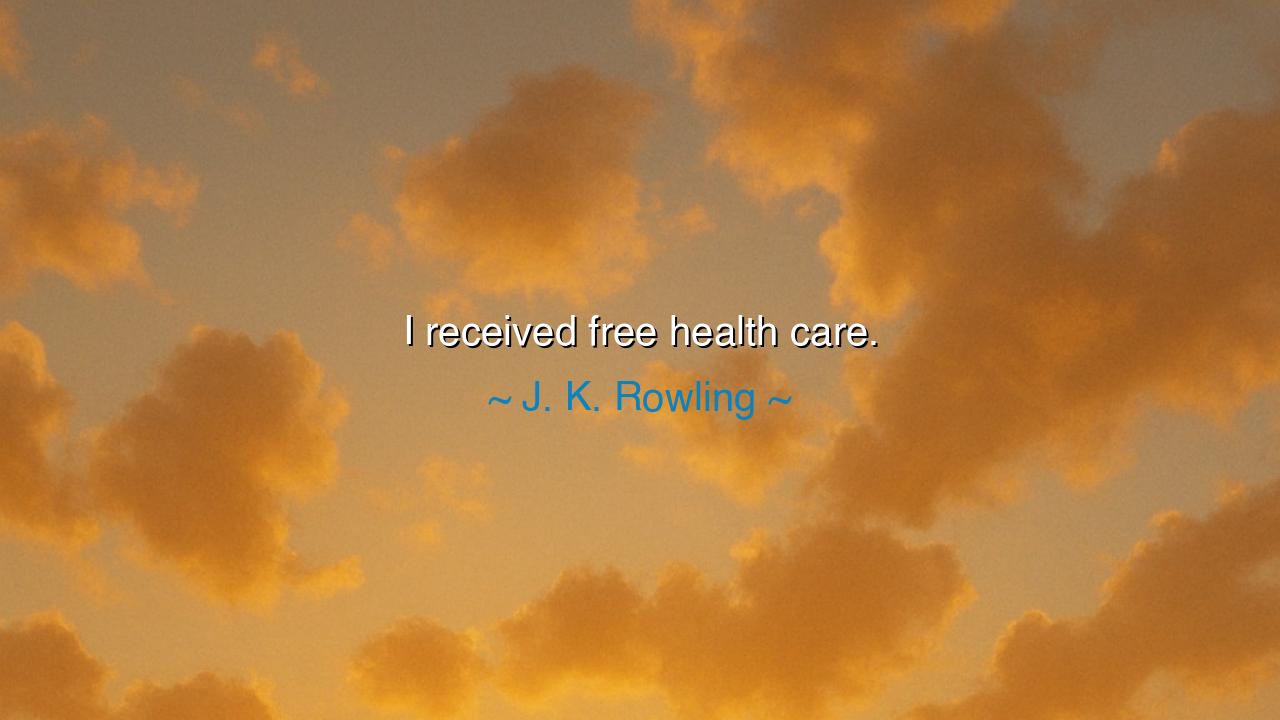
I received free health care.






“I received free health care.” – J. K. Rowling
In these few, humble words, J. K. Rowling, the creator of worlds and bringer of magic, speaks not of fantasy, but of gratitude—for something profoundly human. Her statement is simple, yet it glows with quiet reverence: “I received free health care.” It is not a boast, nor a demand, but a remembrance—a recognition of how compassion made survival possible. Beneath this brief utterance lies a truth as old as civilization itself: that no one rises alone, and that the strength of a people is measured not by its riches, but by how it cares for the vulnerable.
The origin of this quote reaches back to Rowling’s own life before fame, when she was a struggling single mother living in Edinburgh, Scotland, writing the beginnings of Harry Potter in cafes while her child slept beside her. In those difficult years, she lived close to poverty, but the presence of free health care, provided by the National Health Service (NHS), allowed her to endure. Without it, illness—hers or her child’s—could have crushed her before her stories could ever take flight. Thus, her gratitude is not theoretical; it is the gratitude of one who was saved by mercy made real, by a society that placed human well-being above wealth.
When Rowling says these words, she honors not only her own past, but the moral vision that made such care possible. The NHS, born in the ashes of the Second World War, was a triumph of compassion over despair. In 1948, as Britain still staggered from war, its leaders resolved that health should not depend on wealth. Doctors and nurses, weary from tending to soldiers, turned their healing hands toward their own people. The idea was revolutionary: that the body of every citizen is sacred, that no one should suffer or die because they are poor. And thus, free health care became not charity, but justice—a covenant between the state and the soul.
There is an ancient echo in this principle. In the days of Hippocrates, the father of medicine, the healer’s oath was to serve life above profit, to treat all who suffered, whether noble or beggar. The Greeks understood that health was not a luxury but a foundation for virtue and strength. A sick society cannot dream, cannot build, cannot love. Even in the empires of old, when the wise ruled with mercy, public baths and clinics were seen not as gifts to the people, but as duties of civilization itself. Rowling’s words remind us that this wisdom has not vanished—it lives wherever the light of compassion still burns.
Her message carries a deeper moral current. In an age when profit often governs policy, and the poor are asked to justify their existence, Rowling’s quiet statement is an act of remembrance and resistance. She reminds us that human dignity is not measured by economic worth, and that the fruits of civilization must be shared by all, not hoarded by the few. Her gratitude becomes a call to conscience—for what saved her life could save countless others if society chooses kindness over cruelty, inclusion over indifference.
Consider the story of Florence Nightingale, who, during the Crimean War, saw soldiers dying not from wounds but from neglect. She turned chaos into care, and her vision became the seed of modern nursing. Like Rowling, she understood that health is not merely a personal matter—it is the breath of a nation’s soul. When a society heals its people freely, it declares that every life matters. When it withholds that care, it declares that some lives matter less. This is the dividing line between barbarism and civilization.
Thus, let this quote—“I received free health care”—be spoken not only as gratitude, but as prophecy. It tells us that progress is not in the machines we build, but in the mercy we extend. The measure of a people is not the height of their towers, but the strength of their compassion. Let every leader, every citizen, remember that health is not a privilege, but a birthright. The sick must never be left to suffer in silence, nor the poor forced to choose between medicine and bread.
The lesson is clear and timeless: a just society cares for all its members. To honor Rowling’s wisdom, let us build communities where healing is not rationed by wealth, where every child grows in health, and every parent lives without fear of illness destroying their home. For as long as compassion guides our hands, hope will never die. And from that hope—like Rowling’s own story—new worlds of light will always be born.






AAdministratorAdministrator
Welcome, honored guests. Please leave a comment, we will respond soon